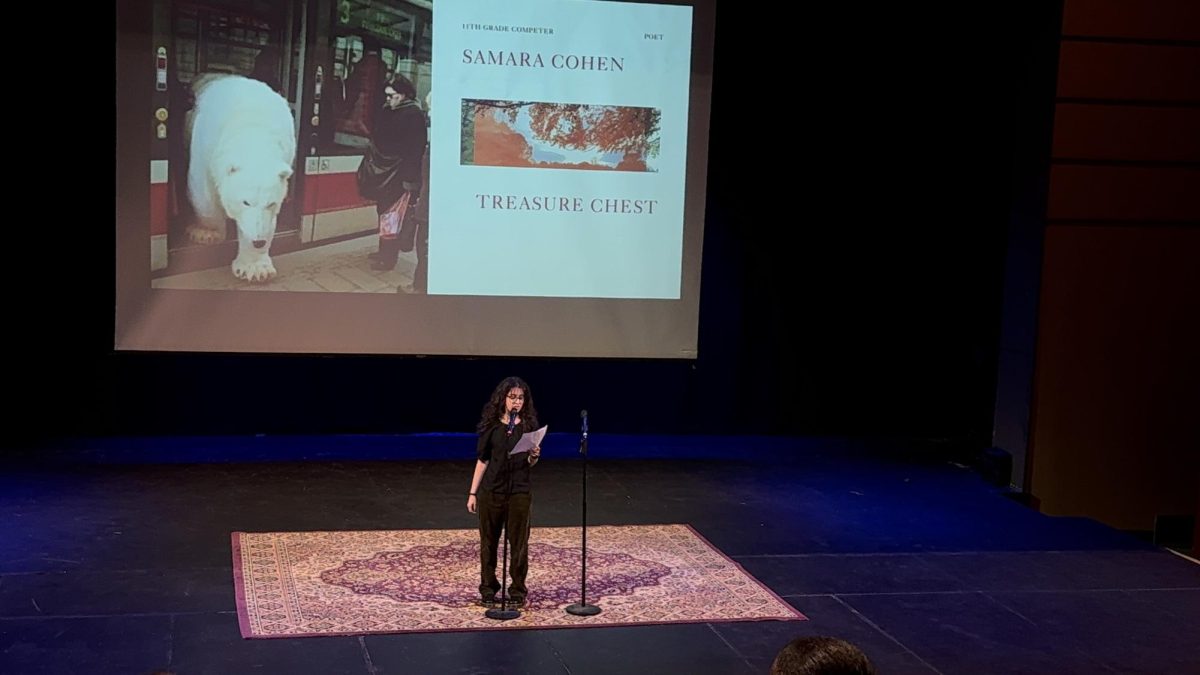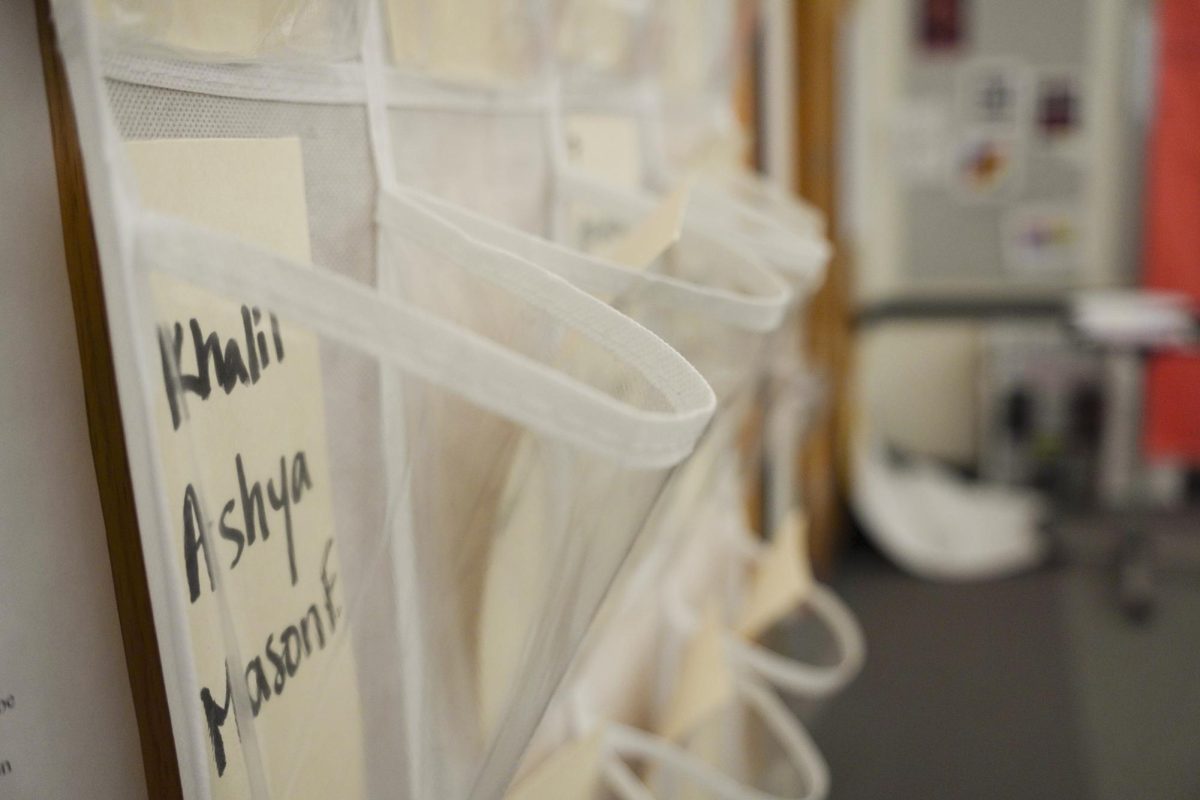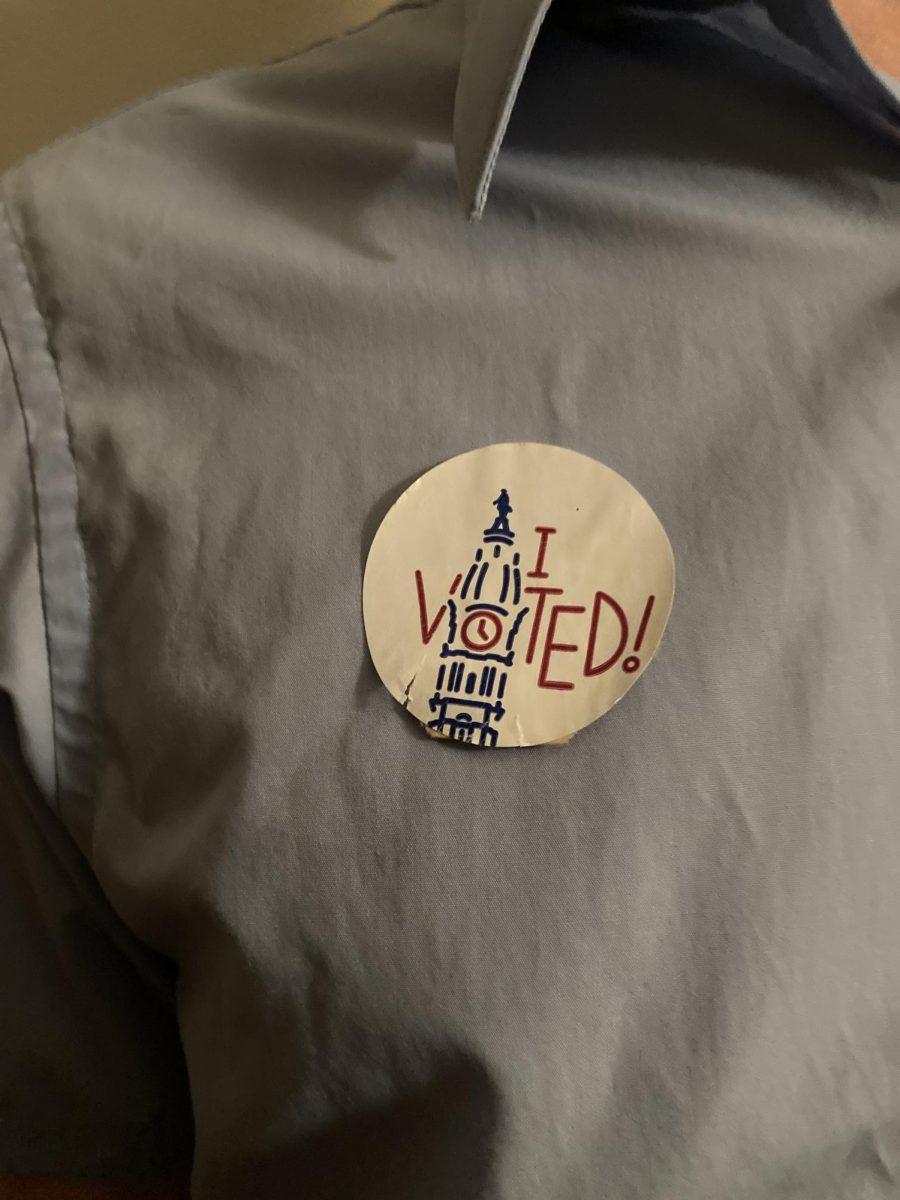Fast fashion is a beast that is affecting our environment as well as our social spheres. The issue is especially prevalent among younger generations, as teens are typically the leading consumers of clothing.
“Fast fashion can be defined as cheap, trendy clothing that samples ideas from the catwalk or celebrity culture and turns them into garments at breakneck speed to meet consumer demand,” said Solene Rauturier, digital strategist at Good On You, a website that educates people on ways to contribute to sustainable fashion and reversing the effects of textile pollution.
Rauturier said, “The idea is to get the newest styles on the market as fast as possible, so shoppers can snap them up while they are still at the height of their popularity and then, sadly, discard them after a few wears.”
According to Vogue fashion journalist Alyssa Hardy, in the 1800s, new clothing styles used to be released in catalogs twice a year: fall/winter and spring/summer seasons. This shifted to faster trend cycles in the 1990s as machinery became more advanced and as demand for clothing began to increase. The rate of production of new trends continued to grow, with today’s leading online fashion retailers, such as Shein and Temu, producing new styles every week.
A poll sent out to Abington Friends School upper school students revealed that 30% of the 58 students who responded reported that they buy new clothing every month. When asked where they most frequently shop, 49.1% said that they mostly shop at big brands, such as Hollister, Shein, etc., while 26.3% said that they make an effort to mostly get their clothing secondhand.
Students have differing opinions on whether or not fast fashion is bad, or if it is simply a way to express yourself.
“I think fast fashion is a way to make clothes for people who want to express themselves with fashion more accessible. I think people hate it because they see it as cheap or an easy way to ‘trend hop,’ but I like it,” upper school student Jaydon Baltimore ‘25 said.
“I think fast fashion, like most trends, is kinda dumb. I much rather have something that will last a long time because I only buy things if I really like them,” Matthew Velazquez ‘26 said.
As seen in the quotes and from the polls taken, teenagers have a variety of perspectives and opinions concerning fast fashion. However, there is an overall consensus of concern and empathy regarding the damages that textile pollution causes on the environment.
“Gen Z — they say, study after study, survey after survey, more than any other generation — they’re saying they want sustainable fashion, and more than any other generation they are the biggest segment of the population buying fast fashion,” said Denise N. Green, an associate professor of fiber science and apparel design at Cornell University in Ithaca, New York for an article in Fashion Dive.
Many students seem to be sustainably conscientious without really trying, buying high quality clothing less frequently, which is already better for the environment than buying cheap, plastic-y, clothing every week.
“I wouldn’t say I make an effort [to shop sustainably], I just don’t shop very often,” said John Mazzacaro ‘25. “When I buy clothes I buy well-produced clothes that will last longer, so in some ways yes, I am buying sustainable clothes that I will not throw away. I buy from larger brands but I don’t buy my clothes cheap from places like Shein.”
“If I’m going to purchase something, spend my money on it, I would like it to be high quality,” Amaya Manigault ‘26 said.
Some students already had a good understanding of what fast fashion is, presumably taking time to learn about the effects of textile waste on the environment.
“I think the actual problem with ‘fast fashion’ is the throwing out part, not the buying frequently part. If you buy new clothes ‘too quickly’ but keep reusing them for years or donate them when you’re done with them, I don’t think that’s a problem,” Rainy Korein ‘27 said.
Research done by KPU on young consumers’ awareness of fast fashion impacts shows that “Gen Z and Millennial students care about sustainability, but lack awareness of the environmental and social impacts of fast fashion.”
A poll sent out to the Abington Friends upper school students revealed that 82.1% of students who responded believe in sustainable fashion.
At AFS, clothing and other apparel is sold to promote the school and to raise money. Megan Schlickmann, director of event operations at AFS, gave insight into how our school participates in the sustainable fashion movement:
Schlickmann said, “One of the vendors, from which we get most of our inventory, is a Certified B Corporation, which means they meet the high standards of social and environmental transparency and accountability.”
AFS puts a focus on the environmental effects of textile waste, specifically when purchasing merchandise from any given vendor. However, AFS also takes into consideration the fact that traditionally, clothing marketed as “eco-friendly” tends to be much more expensive.
Schlickmann said, “We also take pricing into account, ensuring that our merchandise remains affordable for both the school and our families. In terms of manufacturing, we do our best to pay close attention to where the clothing is produced and the one primary vendor we work with is committed to sustainability. Our Certified B Corp partner, for instance, provides us sustainable options that are better for people and our planet.”




























Rainy K • Jan 5, 2025 at 8:38 pm
Thanks for using my quote lol! 🙂
Olivia G • Dec 13, 2024 at 8:43 am
Personally, I don’t usually try to buy from “fast fashion” brands for a number of reasons, like taking into consideration the pollution/clothing waste problem, the awful conditions of the workers producing the clothes, and just the overall quality of clothing that’s usually made. Besides that, I want to find valuable and good quality pieces that’ll last me a nice amount of times and something I genuinely like. I don’t strictly go just thrifting/get secondhand, but I do avoid places that I know aren’t that great, even if a garment looks nice. I’ve heard a varying response from my friends and online, and I would say half have the perspective I have, and the other half don’t mind buying fast fashion because of running trends and the easiness/ very affordable price garments are offered. When I first heard about the environmental impact, it was pretty shocking, as I never usually have bought fast fashion, and I just couldn’t believe people got so tired with their clothing and just disposed of it so quickly as well; it just accumulates in garbage fields and such. It made me even more mindful of what I choose to buy.
Anaria • Dec 12, 2024 at 2:05 pm
For me personally I don’t get my clothes from a main brand. Typically when I go shopping for clothes I look for clothes that feel comfortable to me and that can last for a decent period of time. For my peers it depends I know some types of people like to shop at specific stores or big brand stores while others travel to different clothing stores to find clothing that they like. Honestly it all depends on what they want there clothes to be and there type of clothing style if they have one. I was kinda surprised by the environmental effects but at the same time I’m not because times are changing.
Elise C • Dec 12, 2024 at 1:59 pm
I agree that you should get high quality items compared to the “fast fashion” items. In my experience, whenever I go to a “fast fashion” brand, I make sure that I’m careful with my choices. I think my peers do a mix of this and I agree that I also do sometimes. I’ve noticed a lot of trends at certain time periods that are not popular today, and so I definitely feel as though the environmental impact of purchasing sustainable choices compared to trends has its benefits. (less waste) In all honesty, I was not that surprised when I learned about the environmental impact of fast fashion because I knew the information prior and I agree that generally the best thing to do is to buy quality over quantity.
Aila • Dec 12, 2024 at 1:06 pm
I don’t typically buy my clothes from places like Shein. When I shop for my clothing my family and I try to be mindful of how the company treats the workers who are sewing the clothes. I wouldn’t say that I go out of my way to buy sustainable clothing, but I don’t replace my closet every often and only get “large amounts” of clothes on special occasions like holidays or my birthday. I get a few pieces here and there and it’s never from a place that is known for treating their workers very poorly. I don’t think there is a problem with buying clothing that you like and will wear especially if they are affordable. My problem stems from the conditions of those working in the factories and the pollution that comes from buying clothes just to throw them away 2 months later. I think that it’s different if you can’t afford to buy “nicer” quality clothes because then it’s not your fault. I already knew about the environmental impacts which is why my family and I try not to give more money to the brands that refuse to pay their workers a livable wage. But for a brand to be able to pay their workers a good living, the clothes need to be very expensive to make up for the labor costs, so in that regard, I see the plus for both sides. For me the 3 biggest issues with fast fashion are not that people buy it often, but that some people throw away their clothes recently after they bought them; the impact the industry has on the environment and workers also makes me not want to buy from fast fashion brands.
NC'28 • Dec 12, 2024 at 12:54 pm
I think fast fashion can have a lot of pros and cons. The idea of expressing yourself through clothing has been around for a long time, and it is still one of the most commonly used ways to express yourself. I like the idea of the problem with fast fashion being in the throwing-it-all-out part. I personally like shopping, but when I buy clothes, I’m always looking for ways to buy second hand clothes if I can. If I can’t find it second hand, I try to get it in high quality materials. I think donating clothes instead of just throwing them away helps in so many ways. You can either put them in clothing donation bins, give away to family, or even sell to some thrift stores to make some sort of revenue off of them. I think if we can find a way to make better use of clothes once we’re done with them, it would heal the fast fashion waste issue.
Cora • Dec 12, 2024 at 12:50 pm
I, personally, tend to only buy clothes that I know I’ll love and get a lot of use out of. I feel that fashion is incredibly important to a lot of people on a stylistic and personal level. Clothing serves as an outlet for self expression and many people find a lot of value in that. However, in the fast-paced, commercialized world we live in, putting together a simple outfit has been very convoluted. With new trends every few weeks at least and the pressure that social media puts on looking good, getting dressed has become a minefield for a lot of people. Fast fashion- in theory- is a great way to get your clothes for cheap, but when it comes down to it, fast fashion isn’t just buying clothes. Fast fashion is contributing to unfair labor practices and pollution. On the other hand, however, it’s hard to find good quality clothes that aren’t over priced, leaving the everyday consumer at a crossroads.
Ruhi • Dec 12, 2024 at 8:46 am
I agree that sustainable clothing also costs more than normal clothing, but it also helps in the long run. It lasts longer, ensuring that we get what we paid for, and when it does rip or become too small it’s easier and safer to throw out. It helps sustain the environment so that we have a safe place to buy even more sustainable clothes.
Ruhi • Dec 12, 2024 at 8:42 am
Do you buy clothing from “fast fashion” brands or do you choose more sustainable choices? I try and buy clothing from a mix of sustainable choices and fashion brands. I feel like it’s a great way to compromise and get what I want and at the same time make sure that it benefits the earth. Honestly, I think my peers do similar things because we all know that certain clothes will not last as long leading us to throw those out and buy new ones. I wasn’t really surprised at the environmental impact, because not all clothing is made from sustainable material and once we grow out of it or it rips then it’s in the trash and not properly disposed of.
Molly • Dec 12, 2024 at 8:18 am
I think that this article really speaks to what its like for teens (and consumers) in the US right now. I think that many clothing brands have marketed especially for teens, like Shien for example. Brands like those have made an effort to make their clothing as inexpensive as possible, but have hid the fact that they use child labor to produce their clothing. I personally have gotten my clothes from various different places. I try to go to thrift store as much as I can just because there are many thrift stores where the clothing is curated, so I can go in knowing I may spend more then I would at the average thrift store, but find brands and styles that I like. I think this article definitly made me realize that I need to be aware of where I am buying my clothes from. I try to be mindful when purchasing a piece of clothing, but this article in particular reminded me that I should think about if I really need to buy another piece of clothing, or if I am just falling into the marketing trap that many brands use.
Hannah • Dec 3, 2024 at 7:29 am
I think that it’s unfortunate that the cheapest, and most often, popular brands of clothing are made in such a way. Shein and Temu have been praised for their wide variety and extremely affordable prices, but I think that the environmental and social pitfalls of these companies outweigh the good. There’s something to be said about the culture that fast fashion has brought about., hyping up trends and mass purchasing of many clothes only to be worn a few times. Even if these large quantities of clothes are donated, I’ve noted they flood thrift stores and make it harder to find good quality secondhand clothes amongst the piles of frayed Shein clothes. Unfortunately, there is no current alternative way for late quantities of cheap clothes to be produced in large varieties without a high environmental impact or raising the prices of said clothes.
Lauren • Dec 2, 2024 at 2:02 pm
Hi, Grace! Great article. I agree with every point you made in this piece. With the influx of social media on each generation fast fashion trends like off the shoulder tops and jorts are in. Each individual chooses to express themselves through fashion in some way! If you are feeling sad you can wear all black or a hoodie but if you are happy you can wear bright colors. Overall, fashion is a very versatile topic and it is not a one size fits all. This is especially shown through fast fashion.
Ava Cole • Dec 1, 2024 at 11:26 pm
While I don’t subscribe to or condone what most fast fashion brands do, I unfortunately participate in the cycle. I have always loved fashion and have been using it as a means to express myself since I was a very young child. I think that as teens, we are ever evolving and changing and this is a time in our life when we really care about how we look and fashion is a huge part of that. It sucks that we live in a world where we both have to pay special attention to the environment and explore our evolving identities through our clothing.
percy • Dec 1, 2024 at 9:45 pm
I try to make sure I am not buying fast fashion often but obviously sometimes I buy it either way without knowing. If there is something that I know I will use often I will still get it because I am making sure to not just throw it away and I try to be mindful about not buying into trends. I think many people buy fast fashion because it is affordable but don’t know what fast fashion is so people buy it without realizing the consequences. I was surprised to learn about AFS’s approach to fast fashion and how different companies who choose vendors think through it because that was not a lens I thought about fast fashion through before.
Alana • Nov 29, 2024 at 9:01 pm
I buy most of my clothes from big department brands like Hollister, Garage, Brandy Melville, etc. Those are all fast fashion brands, but most people do not even know big department brands like them are victims of fast fashion. Almost EVERYTHING is fast fashion, which is sad. I think most of my peers buy from fast fashion without really knowing that it is because the big-name brands are covering it up. I feel like it is hard to buy sustainable fashion because of the overly high prices. I am surprised by the environmental impacts, and I think that there should be more department stores that make sustainable fashion affordable to all.
Grace • Dec 2, 2024 at 1:58 pm
Thank you for your comment Alana, I agree that it is becoming harder and harder to buy ethical and sustainable clothing due to the prices rising. It is always going to be a moral struggle between wanting to enjoy the current trending clothing and wanting to support the environment, and I agree that more department stores should be making an effort to create high quality, sustainable fashion for a lower cost; that way more people would be able to still wear the clothing they wanted and keep up with trends, while also not burning a hole in the ozone layer. gracias Alana, ciao
N/A • Nov 26, 2024 at 8:47 am
I believe fast fashion and the mass production of clothing are not the problem in and of themselves, or the problem of these big manufacturing companies, because of the reality of social media and the effects of supply and demand. When there is a demand, someone will find a way to fill that gap in the industry. While I don’t participate in fast fashion myself, I don’t believe its an issue in fact it can be very useful to someone who wants cheap affordable clothing that is popular at the time. It’s what people do after they’re done and the trend is over that is harmful if you just trough them out.
Pharaoh • Nov 26, 2024 at 8:36 am
I don’t think that it is extremely bad for teens my age to want to fit in with the trends but I do think that buying expensive is not a good way to fit in. Personally, I get most of my clothing from thrifting which does not tend to cost as much as going to a store. Also, I do feel that it is different when purchasing from small companies. I think that most of the teens my age tend to spend their money on “IG Brands” which is different from buying from big names but sometimes the brands can get sketchy. Personally, I was pretty surprised that “49.1% said that they mostly shop at big brands.”
Malea • Nov 26, 2024 at 8:26 am
I enjoy getting a lot of my clothes second hand. Even though some of the brands are apart of larger companies, I tend to find better clothes when I shop second hand. I also am able to buy them for a lot cheaper than I would not get them for if buying them from the original store or website. Finding clothes that are considered older or “vintage” is something I do a lot whether it’s online on depop or in person at a thrift store. Half of my wardrobe is filled with secondhand clothes. I think it’s good to be aware of the impact every time you buy new clothes. I also sell my clothes that don’t fit me, never fit me, or I just don’t enjoy wearing. It’s important to take into consideration that someone might want or need something you don’t want or need anymore.
Student • Nov 25, 2024 at 7:09 pm
I don’t have anything bad to say about fast fashion. I think that it is a very useful way to buy clothes. Shein, for example, is a much more affordable way to buy clothes, can can be very useful if someone is trying to expand their style or remake their wardrobe. While I haven’t used Shein or Temu myself, I do see the practicality of those platforms. I also think the biggest thing is using them properly. If you use them just to get what’s popular for the sole reason that it’s trending at the moment, that is more of a problem. A few times for me, a trend has introduced me to pieces of clothes that I genuinely enjoy wearing, and if someone uses Fast Fashion for reasons similar to that or to get a bulk of things they enjoy and plan to wear for a while, it is a much better use of the tool. In my opinion, another way to achieve a similar effect is thrifting or buying from used clothing sites like Depop, where the quality might be higher than something you might find on Shein, but will maintain the cost effective aspect of it.
Sammy • Nov 25, 2024 at 6:17 pm
I think that fast fashion can have some benefits. It makes it easier for people who don’t have the money to afford expensive brands to wear the styles they want. One brand mentioned in the article, Hollister, is nice but it costs a lot. Not everyone can buy from there. But brands like Shein provide clothing almost anyone can afford, even if it’s not as good quality. So I think that fast fashion isn’t all bad, but I do think an important thing to consider is how the workers manufacturing the clothing live and are treated. Fast fashion companies have found ways to get around American labor laws that protect against forced labor, especially forced Uighur labor. I think this isn’t really talked about as much as it used to be, but we should still be considering this when we buy our clothing.
Jaylan Moore • Nov 25, 2024 at 1:13 pm
I don’t have any negative opinions on fast fashion. I think it is a good resource for people to get new clothes and for the most part, isn’t bad quality other than things like Temu and Shein. It can give new and fashionable trends that can last long or die quick. I don’t think there are any problems with it unless you throw them away. Constantly throwing away old clothes that are bad quality and have negative impacts on the environment instead of donating them to places like good will or selling them. I don’t think the problem is fast fashion but the people who always throw away clothes after new trends start and the old ones die out.